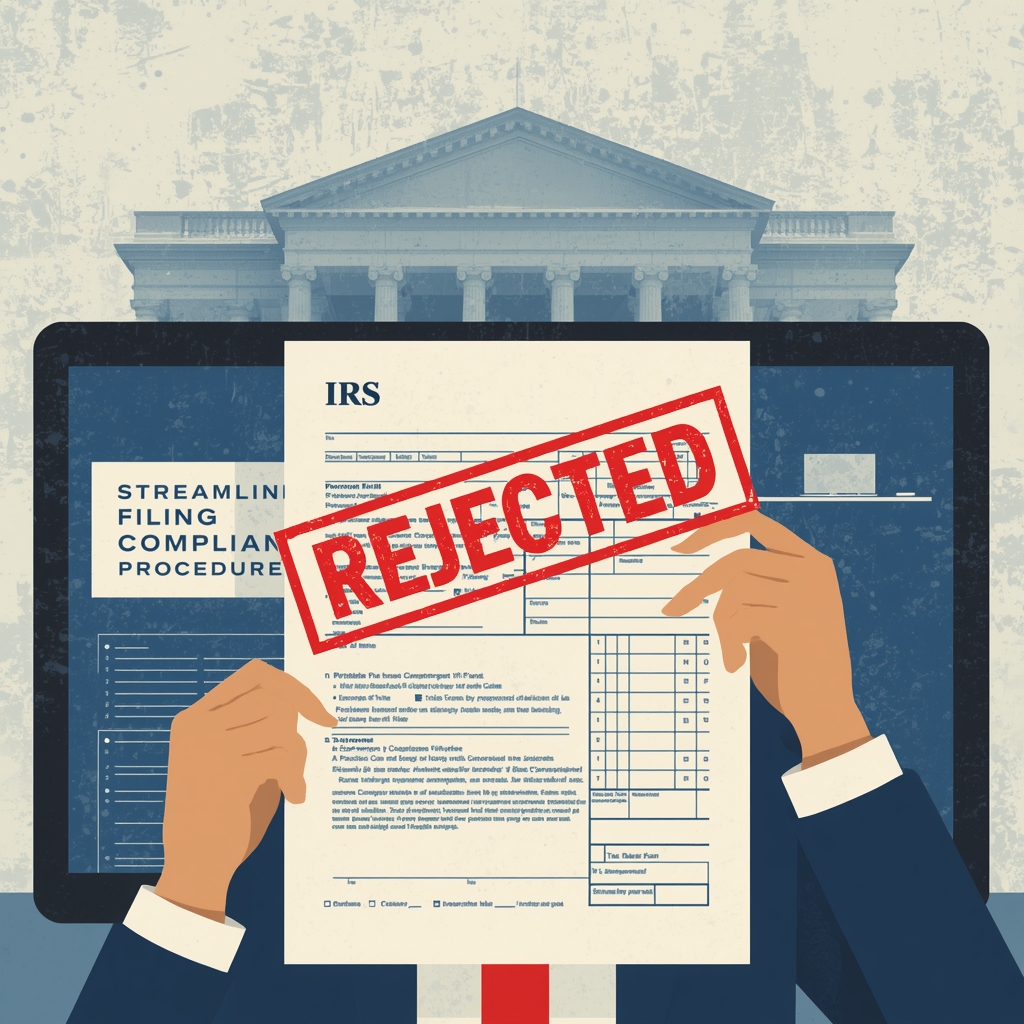Is It Possible to Submit to the IRS Using the Streamlined Filing Compliance Procedures and Have It Rejected?
2025-08-12 14:32:01

Yes, the IRS can reject a Streamlined Filing. Here’s what U.S. expats need to know before using the Streamlined Filing Compliance Procedures.
Understanding the Risks of Streamlined Filing Rejection
For U.S. expats who haven’t filed taxes or FBARs in years, the Streamlined Filing Compliance Procedures (SFCP) often seem like a lifesaver. This IRS program was created for non-willful taxpayers living abroad who want to come clean and get compliant without facing massive penalties. But one common question is: can your submission be rejected? The short answer is yes — and here’s what that means.
What Is the Streamlined Filing Compliance Program?
The Streamlined Filing Compliance Procedures are designed to help U.S. taxpayers who failed to report foreign income and foreign accounts, like FBARs or FATCA disclosures, in a non-willful way. For U.S. citizens living abroad, this program requires:
-
Filing the last 3 years of U.S. tax returns
-
Submitting 6 years of FBARs (FinCEN Form 114)
-
Completing a signed statement (Form 14653) explaining why the non-filing was non-willful
In return, the IRS waives penalties that might otherwise total tens or even hundreds of thousands of dollars.
Can the IRS Reject a Streamlined Filing?
Yes. While the IRS doesn’t issue formal “acceptance” or “approval” letters, it can review and later reject a submission if it finds the taxpayer was willful or omitted key information.
Let’s break this down:
-
No news isn’t always good news. The IRS does not send out a confirmation when your streamlined submission is accepted. If you don’t hear anything for a while, that’s often a good sign — but not guaranteed.
-
Audits can still happen. If the IRS audits your submission and determines that your failure to report was willful, you may lose the protection of the streamlined program and face full FBAR penalties.
-
Incomplete or inconsistent information in your Form 14653 can also raise red flags.
The Jones Case: A Real Example of Rejection
In the case referenced in many legal blogs, a taxpayer (referred to here as "Mr. Jones") attempted to use the streamlined procedures after years of non-compliance. However, the IRS later found evidence that Mr. Jones knew he was supposed to report his foreign accounts — such as emails to his bank asking to avoid U.S. tax reporting.
That single action tipped the scale from “non-willful” to willful failure, and the IRS invalidated his streamlined protection. As a result, Mr. Jones became liable for full FBAR penalties, which can reach $100,000 per year or 50% of the highest account balance, whichever is greater.
Common Reasons Streamlined Filings Are Rejected
Here are the most frequent pitfalls:
-
The non-willfulness statement lacks detail
Simply saying “I didn’t know” isn’t enough. You must clearly explain how and why you failed to file, and why it wasn’t intentional. -
Inconsistent documentation
If your statement conflicts with bank records, emails, or prior tax filings, the IRS may consider it misleading. -
Evidence of willfulness
Moving money between accounts, creating nominee structures, or asking banks not to report to the IRS can all signal willful conduct. -
Past IRS contact
If you were previously contacted about foreign accounts and then chose not to comply, it’s hard to argue non-willfulness.
What Happens If You’re Rejected?
If your submission is reviewed and rejected:
-
You lose the penalty protection of the streamlined program
-
You may be subject to full FBAR penalties
-
You might face an IRS audit, with potential civil or criminal consequences
-
You could be denied future relief options
For expats, this can be a devastating outcome — especially if you believed you were doing the right thing by coming forward.
How to Reduce the Risk of Rejection
Here’s how to improve your chances of a successful submission:
-
Work with a tax professional experienced in expat compliance and streamlined filings
-
Draft a detailed, honest Form 14653 — this is not the place to be vague
-
Review your bank documents and correspondence to ensure nothing contradicts your claims
-
Be consistent across all years and all accounts reported
Key Takeaway for Expats
The streamlined program is a powerful tool for fixing past tax mistakes — but it’s not a guaranteed safety net. If there’s any doubt about your eligibility or risk of willfulness, it’s better to get professional advice before submitting.
Remember, the goal is to stay compliant and minimize risk — not just check a box.
FAQs
Q: What if I already submitted and haven’t heard anything from the IRS?
A: That’s typically a good sign. The IRS doesn’t send confirmation notices. If they don’t contact you, it likely means your submission is being accepted.
Q: Can I re-submit if I’m rejected?
A: No, you usually only get one shot at streamlined filing. If rejected, you may need to pursue another route, like the Voluntary Disclosure Program.
Q: Is there a deadline to file under the streamlined procedures?
A: As of now, there’s no set expiration date — but the IRS can change this at any time.
Final Thoughts
Submitting through the Streamlined Filing Compliance Procedures can be life-changing for expats — but only if done right. While most honest filers are accepted without issue, the IRS does review filings and can reject them when it finds inconsistencies or signs of willfulness.
The best way to stay protected? Be thorough. Be honest. And don’t go it alone.
M.Daniyal